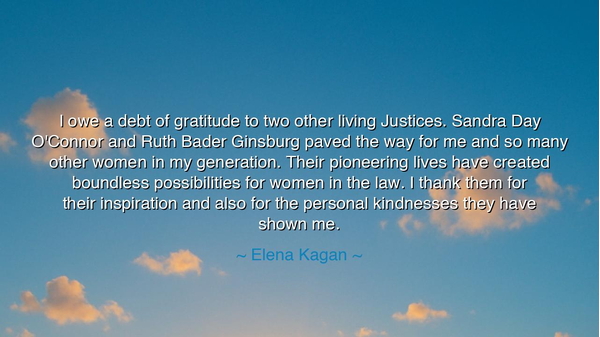
I owe a debt of gratitude to two other living Justices. Sandra
I owe a debt of gratitude to two other living Justices. Sandra Day O'Connor and Ruth Bader Ginsburg paved the way for me and so many other women in my generation. Their pioneering lives have created boundless possibilities for women in the law. I thank them for their inspiration and also for the personal kindnesses they have shown me.






Hear, O inheritors of justice, the words of Elena Kagan, who spoke with humility and reverence: “I owe a debt of gratitude to two other living Justices. Sandra Day O’Connor and Ruth Bader Ginsburg paved the way for me and so many other women in my generation. Their pioneering lives have created boundless possibilities for women in the law. I thank them for their inspiration and also for the personal kindnesses they have shown me.” In this saying, she honors the lineage of courage, the chain of women who broke barriers so that others might walk unshackled.
For Sandra Day O’Connor, the first woman to ascend to the Supreme Court, stood as a solitary figure in 1981, breaking through centuries of exclusion. Her presence alone was a testament that the halls of law, long reserved for men, could no longer deny half of humanity. And Ruth Bader Ginsburg, warrior for gender equality, carved out victory after victory with intellect as her sword, reshaping the law to reflect the truth of equality. Together, they lit torches that would burn for those who followed.
Kagan, upon her own rise to the Court, recognized that her triumph was not hers alone, but the fruit of paths cut through stone by O’Connor and Ginsburg. She names this as gratitude, acknowledging that no achievement stands isolated. Just as a tree grows because roots have sunk deep into the soil, so too her place on the bench was nourished by the sacrifices and battles of those before her.
History is filled with such chains of legacy. Recall how Elizabeth Cady Stanton and Susan B. Anthony fought for women’s suffrage, knowing they might never live to see its victory. Yet because of their courage, generations after them could cast their ballots freely. In the same way, O’Connor and Ginsburg endured loneliness, resistance, and prejudice, so that Kagan and her generation might rise not as exceptions, but as rightful equals.
Therefore, let this truth endure: progress is not born in a single moment, but is carried forward by the courage of pioneers. Boundless possibilities are never gifts—they are earned by those who fought in years past. And so Kagan’s words remind us to honor the ones who came before, to recognize the debts we owe, and to carry the torch forward, so that the path grows ever brighter for those yet to come.






TLNguyen Thuy Linh
Reading Kagan’s reflection on the influence of O'Connor and Ginsburg is a powerful reminder of the importance of paving the way for others. Their paths in the legal field opened up so many possibilities for women. But the question remains—how can we build on their foundation and continue creating spaces for women in law and other traditionally male-dominated fields? Are we doing enough to ensure that women today don’t have to work twice as hard to achieve the same recognition?
HNHac Nguyet
I appreciate Kagan’s acknowledgement of the paving done by O'Connor and Ginsburg. Their legacies have had an undeniable impact on women in law. But what about other sectors that still lack strong female representation in leadership roles? How do we ensure that women in fields outside law are given the same opportunities to break barriers? Kagan’s words remind me that the work of pioneering women continues to create a ripple effect, but how far does that ripple really extend?
ABAi Bui
It’s really humbling to see Kagan’s gratitude toward O'Connor and Ginsburg. Their contributions to women’s rights and the legal field are undeniable. However, reading this also makes me wonder how much the legal system still favors certain demographics. Have things really changed for women in law, or is it just a small shift in a still male-dominated field? It would be interesting to explore what more can be done to ensure that women continue to rise in law without facing constant challenges.
HGhuong giang
Kagan’s recognition of O'Connor and Ginsburg’s impact on her career really shows the power of representation. It’s incredible how their hard work not only shaped the law but also inspired countless women, including Kagan herself. But as much as we celebrate their achievements, it makes me question—what still holds women back in the legal profession today? While the path is more open, are there still invisible barriers preventing the next generation from achieving as much?
NDNguyen Ngoc Dieu
Elena Kagan’s words about Sandra Day O'Connor and Ruth Bader Ginsburg really highlight the importance of mentorship and role models. It’s amazing to think how the paths they paved opened so many doors for women in law, not just in the U.S. but globally. It makes me wonder, though—how many other fields are still lacking such trailblazers for women? How can we encourage more women to step up and mentor others the way O'Connor and Ginsburg did?